Home Cost 8kW Solar System Cost
8kW Solar System Cost
If you find that your energy needs are somewhat higher than average, then an 8kW solar system is spot on for what you require. This article gets into the essential details of the system, including its cost, how long it will take to make your money back, and the anticipated financial benefits.
An 8kW solar system will cost you $9,107 on average. The real range is between $8,668 and $9,506. The exact price depends on the quality of the panels and performance specs.
There are cheaper alternatives on the solar market, but the quality matters most because you get what you pay for.
| Low end | $8,668 |
|---|---|
| Average | $9,107 |
| High end | $9,506 |
Table of Contents
ToggleAverage Cost of 8kW Solar System by City in Australia
Below is the average cost of an 8kW solar system in Australia’s capital cities. The price difference is based on varied government rebates and local economies.
| City | Average cost | Average cost per watt |
|---|---|---|
| Adelaide, SA | $9,107 | $1.13 |
| Brisbane, QLD | $8,668 | $1.08 |
| Canberra, ACT | $9,107 | $1.13 |
| Hobart, TAS | $9,506 | $1.18 |
| Melbourne, VIC | $9,506 | $1.18 |
| Sydney, NSW | $9,107 | $1.13 |
| Perth, WA | $9,107 | $1.13 |
| Darwin | $8,668 | $1.08 |
What Is the Rebate Amount on an 8kW Solar System?
The Australian government solar rebate varies depending on the state you live in. For an 8kW solar system, you will receive a rebate of approximately $2,234 in VIC and TAS and around $2,633rebate in NSW, QLD, SA, and WA.
This price can go up or down by approximately 5%, depending on the current STC’s price.
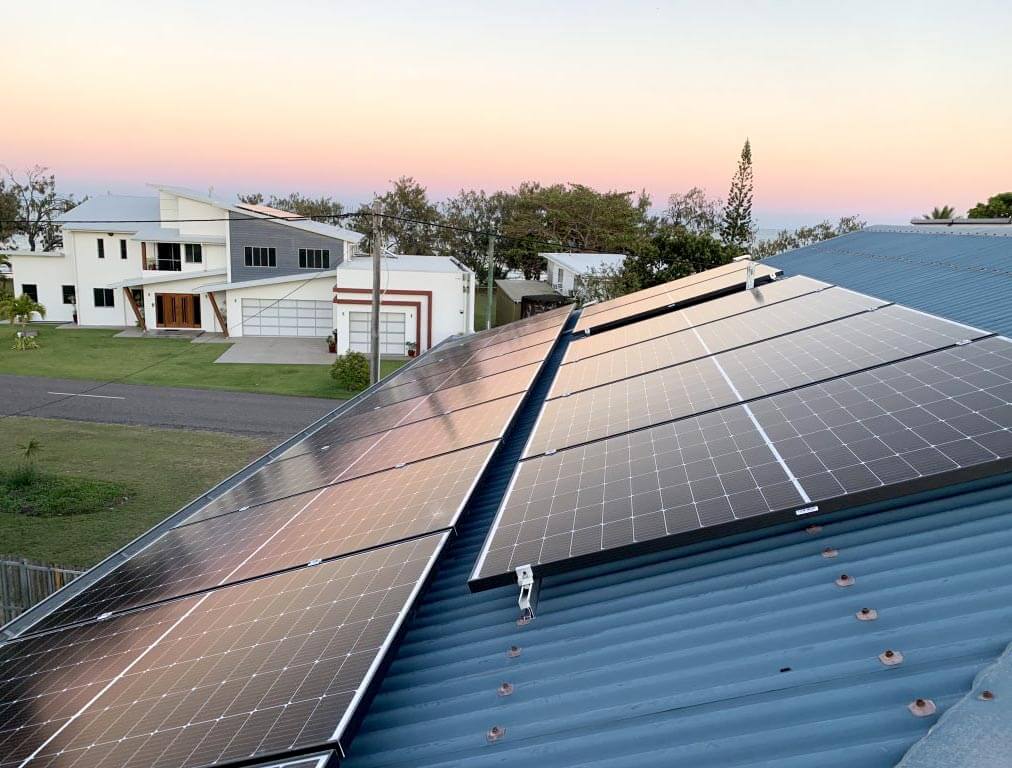
How Much Solar Power Does an 8kW Solar System Produce?
The 8kW solar PV system produces an average of 35kW per day. However, like all solar systems, the actual power output depends on variables such as:
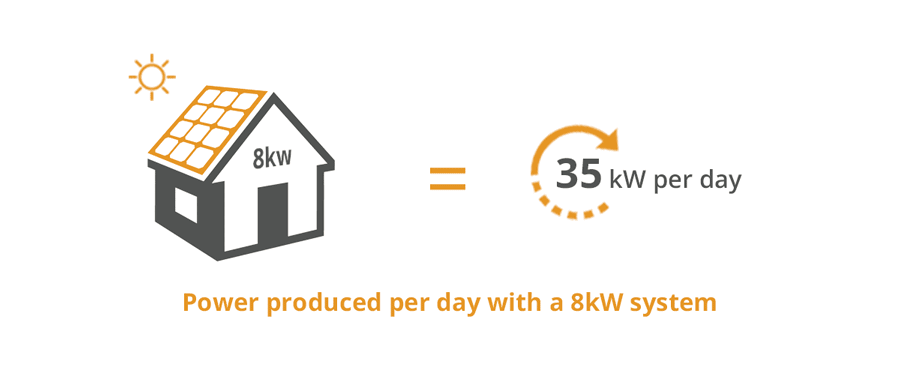
- Location and climate
- Shading issues
- Roof pitch
- Tilt angle and orientation of the panels
- Amount of sunshine – when the panels overheat, their power output reduces.
- Quality and size of the solar system’s inverter
- Performance of individual components of the system
The most crucial factor is the amount of sunshine available in a particular area. The average power output of a solar panel is usually determined during the Peak Sun Hours (PSH), which is equivalent to 1hr of full sunlight.
In most regions, the peak sun is usually around 12 noon or 1 pm. Sunshine, however, tends to be weaker during early mornings and late afternoons.
How To Calculate Solar System Output
Below is a simple formula for calculating the power output of your 8kW solar system.
Solar system watts (8kW) x Peak Sun Hours (PSH) x75% = daily watts hours.
The 75% accounts for all the variables mentioned because no solar system is perfect.
For example, the PSH in Darwin is 5.5. So:
8kW x 5.5PSH x 75% = 33kWh
8kW Solar System Output in Australia’s Capital Cities
| City | Approximate average daily energy yield | Approximate average annual energy yield |
|---|---|---|
| Adelaide | 29kWh - 33kWh | 12,264kWhs |
| Brisbane | 31kWh - 33kWh | 12,264kWhs |
| Canberra | 29kWh - 33kWh | 12,556kWhs |
| Hobart | 26kWh - 29kWh | 10,220kWhs |
| Melbourne | 28kWh - 32kWh | 10,512kWhs |
| Sydney | 30kWh - 33kWh | 11,388kWhs |
| Perth | 32kWh - 35kWh | 12,848kWhs |
| Darwin | 35kWh | 12,848kWhs |
How Much Can I Save With an 8kW Solar Power System?
The exact amount you can save from an 8kW solar system depends on:
- The amount of electricity you consume
- The amount of electricity you export to the grid
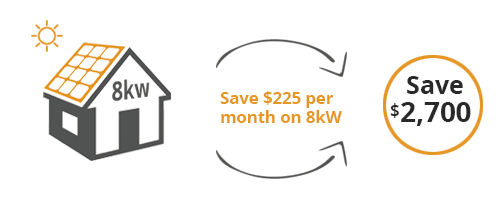
A good quality 8kW solar system can save you around $3,500 annually on your electricity bills.
However, to save this kind of money per quarterly bill, you must use as much of the generated power as possible during the day. This is about 40kWh during daylight hours over the summer months.
Can You Bank on Solar Feed-in-Tariffs?
Currently, state-based solar feed-in-tariffs are not as important as a few years ago. Feed-in-tariffs are either minimal or voluntary, which means electricity retailers are no longer obligated to pay you.
Self-Consumption Is the Way To Go
Consuming most of the power generated by your solar system will save you a lot of money on electricity bills.
Depending on your retailer, location, and tariff used, you can save from 22 cents to 28+ cents plus GST for every kWh of solar energy you use in your home.
These rates are much higher than the rates the same retailers offer for excess solar power sent to the grid ( which ranges between 5-12 cents per kWh in most Australian states).
Taking this into account, your 8kW solar system could save between $700 to $850 per quarterly bill.
How Can I Optimise Self-Consumption?
To get the most out of your solar system, you should:
- Install a high-quality 8kW system
- Understand your self-consumption profile (how and when you use most of the generated electricity). Then use as much of the electricity as possible.
What Is the Average Payback Period?
The average payback period for a high-quality solar system is between 3 to 4 years. Technically, you can start as soon as your system starts to generate power.
Buying a quality solar system guarantees you a return on investment within 5 years!
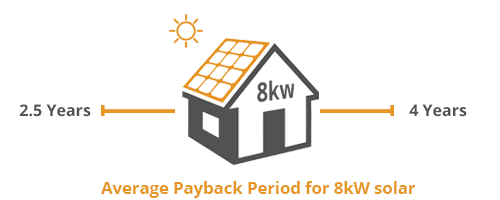
However, you may need to replace your solar inverter after 15-20 years to keep up with your solar system.
Finance Repayments on an 8kW Solar Power System
Expect to pay between $200 to $400 per month as repayment for your fully installed 8kW solar system.
Note: This rate may vary drastically as it is based on average finance rates for residential solar systems.
What Kind of Household Does an 8kW Solar PV System Suit Best?
An 8kW solar system is best suited for large homes with high electricity needs. If you have large electronic appliances like reverse cycle air conditioning, washers, dryers, and a swimming pool, and you have an electricity budget of up to or more than $500 per quarterly bill, then the 8kW solar system is an excellent choice.
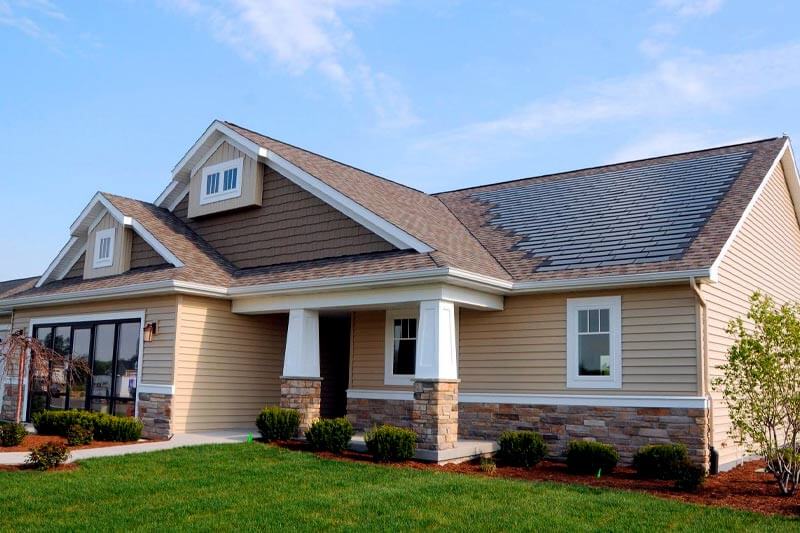
How Many Solar Panels for an 8kW Solar System?
An 8kW solar system comprises around 21 to 28 solar panels. It is essential to buy quality solar panels for such a large system to make sure you maximize the system’s reliability, performance, lifespan, and output in different weather conditions.
Using high-efficiency solar panels means you can get more power for less roof space and fewer panels. Below are common solar panel size combinations that can make up an 8kW solar system.
- 240W (33 x solar panels to make 8kW)
- 250W (32 x solar panels to make 8kW)
- 260W (31 x solar panels to make 8kW)
- 300W (27 x solar panels to make 8kW)
- 330W (25 x solar panels to make 8kW)
How Much Roof Space Does an 8kW Solar Energy System Need?
The amount of roof space you need depends on the type of panels you use. Large panels (in watts) tend to be more efficient, so you will only need a few of those on your roof.
Most solar panels measure about 1.7m x 1m. So, if you use 250W for your 8kW system, you will need approximately 13.6 square metres of roof space.
What Can I Run With an 8kW Solar System?
If you decide to go completely off-grid, below is a home load reference for your 8kW solar power system.
| Load Name | QTY | Load Rated Power | Total Rated Power |
|---|---|---|---|
| Lights | 12 | 11W | 132W |
| Fan | 4 | 80W | 320W |
| Computer | 2 | 150W | 300W |
| Refrigerator(200L) | 3 | 120W | 360W |
| Printer | 1 | 250W | 250W |
| Fax machine | 1 | 150W | 150W |
| Washing machine | 1 | 300W | 300W |
| Microwave | 1 | 1500W | 1500W |
| Electric cooker | 2 | 300W | 600W |
| Air conditioner(1.5HP) | 3 | 1125W | 3375W |
| Satellite TV receiver/VCD | 1 | 25W | 25W |
| Colour TV(32 inch) | 2 | 150W | 300W |
| Water Pump | 1 | 200W | 200W |
| Total | 7812W | ||
Note: This example is for reference purposes only. Different homes have different electricity needs, so your load can be more or less than 8000W.
Also, keep in mind that water pumps, air conditioners, and refrigerators are inductive loads, so their starting power is three to six times more than normal power. To use this equipment, ensure you turn on the inductive load first.
8kW Solar System Key Numbers
Below are the key numbers of an 8kW solar power system at a glance.
| Description | Key numbers |
|---|---|
| Number of panels | 22 x 370W Panels |
| Power output | 35 kWh per day |
| Potential savings | $700 - $850 per billing cycle depending on how much you pay for electricity |
| Average payback period | 3 to 5 years |
| Cost | Between $7500 and $13000 |
| Suited to | Medium to large households using an average of 32kWh per day during the daytime or within 24 hours with battery storage. |
| Repayments | Between $200 to $400 for 5 years |
8kW Solar Energy System With Battery Storage
An 8kW solar system generates an average of 35 units per day. Since you will need about 70% power at night and 30% to 40%during the day, a battery with a storage capacity of 22.4Kwh will be ideal.
You can use this battery calculator to calculate the number of batteries you need for your 8kW system.
Keep in mind that battery storage is quite costly and may increase your payback period. For this reason, ensure you buy high-quality batteries to maximize reliability, performance, and lifespan.
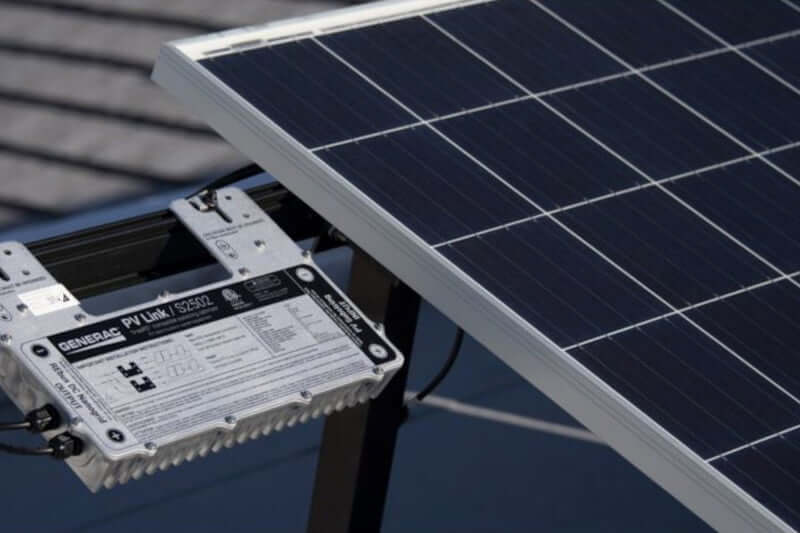
Is 8kW the Right Solar System Size for Me?
Whether or not an 8kW solar system is right for you depends on your daily power needs.
If you have a large house and you consume about 35kWh to 40kWh of power every day, an 8kW solar system is the right size for you.
Also, if you run a small business and your daily consumption averages around 30.8kWh to 48.3kWh, installing an 8kW solar system will help reduce your electricity bills.
Where Can I Buy the Right Solar System?
Choosing the right solar system can be challenging, whether you are updating your system or installing a new one. That is why you should explore your options before selecting any system.
We can help you find a quality solar system by linking you to reliable solar providers within your area. All you have to do is:
Use This FREE Service
GoSolarQuotes.com.au matches you with three local solar installers voted #1 by previous users in your area.
“No hard sales, just friendly advice, and great prices”
- Scroll up to the top of the page and enter your postcode in the blue form.
- Answer a few simple questions about your solar needs
- Your solar job details are forwarded to the closest three solar installers, all voted best priced, by previous homeowners near you.
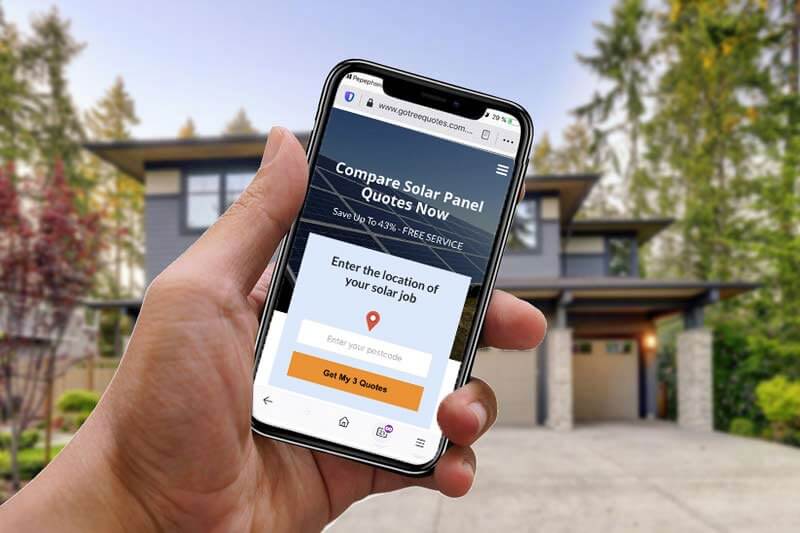
Quality manufacturers will always support their brands. So, before you buy any solar system, ensure you check whether the company offers warranty support in Australia.
FAQ's
This depends on your daily energy needs. An 8kW has an average output of 35kWh per day, which is enough to run several appliances like your washing machine, dryer, dishwasher and keep your water heater functional all day long.
Yes, you can go off-grid with solar panels as long as you have battery storage.
Solar panels generate energy during the day when the sun is up, but the photovoltaic cells will not trap any electricity at night. So, if you want to go completely off-grid, you will need to invest in a quality battery system to store the excess solar energy produced during the day.
The number of solar panels you need to go off-grid depends on:
- The amount of electricity you use per day
- Amount of direct sunlight in your area
- The type and quality of solar panels you use
- Your roof space
Ideally, an average home that wishes to go off-grid can rely entirely on a 7kW solar system. So, with about 28 solar panels and a sustainable battery backup system, you are good to go.
Note: the number of batteries you will need to go off-grid will depend on your solar system size.
Yes, an 8kW solar system is absolutely worth it if you want to save on electricity costs and protect the environment. Investing in a good quality 8kW system that meets your daily power needs will help you gain energy independence.
Compare Solar Panel Quotes
Table of Contents
Toggle









